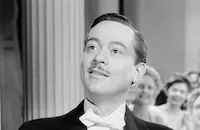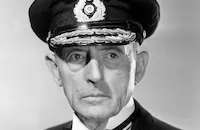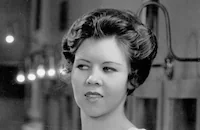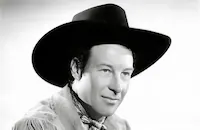The Murder of Dr. Harrigan

Brief Synopsis
Cast & Crew
Frank Mcdonald
Ricardo Cortez
Kay Linaker
John Eldredge
Mary Astor
Joseph Crehan
Film Details
Technical Specs

Synopsis
Although there are bad feelings between Dr. Harrigan and Peter Melady, the founder of the hospital in which Harrigan works, over ownership of the formula for a new anesthesia that can be used on people who do not tolerate ether, Melady specifically requests Harrigan as his surgeon when he needs an operation. Harrigan's, wife Ina, who is in love with another man, is also a patient in the hospital as is Melady's daughter Agnes, an old friend of nurse Sally Keating. When Melady's regular doctor, Dr. Coate, objects to his patient being operated on by another doctor, Harrigan decides to perform the surgery that night rather than wait for the morning. Sally arrives at the operating room to assist in the surgery, but Melady is not there. She institutes a hospital-wide search, finding Harrigan's dead body in the elevator but no sign of Melady. During the police investigation, several things throw suspicion on Sally, but George Lambert, an intern who is in love with Sally, decides to help clear her. George and Sally find the body of a dead black man in the basement and realize that Melady's body, rather than the black man's, was taken to the morgue. An autopsy is performed on Melady's body after it is determined that he died of fright. When Sally is arrested, George tells the police that he believes that Agnes slipped a vial of anesthesia into Harrigan's drinking water, making him unconscious. According to George, Melady died of fright when one of the inventors of the drug tried to threaten him. After George poses his theories, Sally is attacked by someone searching for the drug. When her attacker is captured, he is revealed to be Simon, another intern who also worked on the formula. Nurse Lillian Cooper then confesses that she wiped the handle of the murder weapon clean because she knew Simon was the murderer. She hated Harrigan, her former husband, because he divorced her in order to marry a wealthy woman. Dr. Coate apologizes to Sally for his suspicions about her, but she admits that she is leaving the hospital anyway to marry George.

Director
Frank Mcdonald
Cast

Ricardo Cortez
Kay Linaker

John Eldredge

Mary Astor

Joseph Crehan

Frank Reicher
Anita Kerry

Phillip Reed
Robert Strange

Mary Treen

Gordon Elliott
Don Barclay
Johnny Arthur
Joan Blair
Ellen Lowe
Frank Shannon
Martha Tibbetts
Mary Russell
Crew

Film Details
Technical Specs

Articles
The Murder of Dr. Harrigan
In the film version, the nurse is played by 23-year-old Kay Linaker in her movie debut. Linaker already had a Broadway career -- and the trailer for this film told audiences, "You'll love this girl!" -- but movie stardom was unfortunately not in the cards. She went on to appear in some five dozen movies, with her parts getting smaller and smaller all the way down to uncredited bits, until she retired from the screen in 1945. Linaker is probably best remembered by modern film fans for appearing in a handful of Charlie Chan pictures, but she also (under the name Kate Phillips) wrote the screenplay for the 1958 sci-fi classic The Blob, and wrote for radio and television. Later she became a college professor in New England, teaching courses on acting, writing and public speaking, before retiring in 2005 at the age of 92. She died in 2008.
The action of The Murder of Doctor Harrigan is set in a hospital, where a doctor is murdered on his way to an operation, opening up a plot involving the secret formula for a new anesthetic. Linaker is paired romantically with Ricardo Cortez, playing a doctor. Variety thought they generated "fair romantic interest" but overall deemed the film too formulaic and routine to cause any great shakes, even with the presence of co-star Mary Astor.
While Hollywood in the 1930s did put some popular female detectives on the screen -- like Nancy Drew, Hildegarde Withers and Torchy Blane -- Nurse Sarah Keate never really caught on. She was almost always played by a different actress and went by different names, and moreover the character was never really devised as an actual sleuth. Instead of solving mysteries, she helps others do the solving. In The Murder of Doctor Harrigan, she doesn't even do much of that! Eberhart, in her novels, also conceived the character as older, as something of a spinster, but Hollywood brought her age down for most of the films. In the first, While the Patient Slept (1935), she was played by Aline MacMahon. Then came Linaker in The Murder of Doctor Harrigan. Afterwards, she was played by Marguerite Churchill in Murder by an Aristocrat (1936), by Jane Darwell in the Fox entry The Great Hospital Mystery (1937), and then by Ann Sheridan back at Warner Brothers in the final two films, The Patient in Room 18 (1938) and Mystery House (1938). A seventh, unrelated, film, The Dark Stairway (1938), was made in England from the same source material as The Murder of Doctor Harrigan.
Mary Astor had already appeared in about 75 films at this point, in a career stretching back to 1920. She later described this and her other pictures of the time as "all enjoyable for me in a sort of social way: congenial people, no problems -- set it up and shoot it. Lunch and jokes in the commissary. No sweat. No nothing."
She also wrote that during this period in her career, she was simply grinding out movie after movie, doing her job and building up experience: "In the beginning I had a bit of enthusiasm -- I usually did at the start of a picture -- but after awhile I got to the point where I'd come on the set and ask, 'Which door do I come in, where do I stand, and what do I say?' And it showed. I was as two-dimensional as the screen itself: cool, indifferent, looking lovely in close-ups. Period. Period. Period. When was I ever going to learn to act! You can't learn if you can't experiment and find what works, and doesn't work. But the hours are long, the schedule rigid, so I did what I was told and saved time and money for the front office. And got a lot of jobs that way."
This was the second film to be directed by Frank McDonald, a veteran dialogue director. He'd go on to direct over 100 films -- mostly in the "B" world -- and dozens of TV episodes.
The Murder of Doctor Harrigan carries a "Clue Club" label in its credits -- a reference to a promotional tie-in to Black Mask Magazine, which endorsed several Warner Brothers mystery films this way in 1935-36. Youngsters were encouraged to attend the pictures and win prizes by filling out special cards. The series was short-lived. Some of the other titles bearing the Clue Club stamp are The Florentine Dagger (1935), While the Patient Slept (1935), The White Cockatoo (1935), The Case of the Velvet Claws (1936) and The Case of the Black Cat (1936).
By Jeremy Arnold
SOURCES:
Mary Astor, Mary Astor: A Life on Film
Ron Backer, Mystery Movie Series of 1930s Hollywood
Michael R. Pitts, Famous Movie Detectives II

The Murder of Dr. Harrigan
Quotes
What do you expect to find at the morgue?- Nurse Sally Keating
What do you usually find at a morgue?- Doctor George Lambert
A lot of your patients!- Nurse Sally Keating
George, you have proposed to me in many different ways, and many different places, but I'll only accept you in an environment fitting of your actions.- Nurse Sally Keating
Oh yeah, where's that?- Doctor George Lambert
The psychiatric ward!- Nurse Sally Keating
Trivia
The part of Nurse Sally Keating was originally intended to be played by Mary Astor. When Astor refused to play the role, Warner Bros. signed Broadway actress Kay Linaker to play Keating, and as punishment, the studio forced Astor to play a supporting part in the film.
Notes
This film was Frank McDonald's first directorial effort. He had previously worked as a dialogue director. This was the first of two Warner Bros. films featuring the character of Sally Keating.















